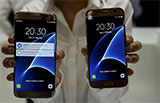Created-in-China products need promoting
By Hong Liang (China Daily) Updated: 2012-10-15 13:38One evening last week, I decided to browse the Internet to update myself on the latest electronic gadgets, as I want a new toy to help pass away the grueling winter months. No, I am not a geek, and I can't afford any of the latest hardware that pack enough computing power to send objects into orbit. But it's nice to know what the latest smartphones and laptops are capable of doing.
There are a few sites specializing in consumer electronics which I have bookmarked. They all have the most up-to-date technology news making it very convenient for readers to browse and select the items that are of particular interest to them.
But one thing struck me as I scrolled through the pages and pages of entries on one site: there was hardly a mention of mainland companies other than an item about Lenovo building a computer factory in the United States.
It's hardly surprising that the sites are filled with stories about Apple and Microsoft. And there are quite a few on such well-known global electronics manufacturers such as Samsung and Sony. I also read a few stories about new cellphones developed by Taiwan's HTC and Korea's LG. And, of course, what Google is doing with its Android mobile operating system is always closely monitored.
Many clever ideas, no matter how trivial they may be, from otherwise unheard of companies are also deemed worthy of a mention. I was amused by the Larklife Band, which can track the wearer's activity, sleep pattern and food intake. Well, it doesn't actually detect what the wearer eats. It requires the wearer to input the food he or she takes for dietary monitoring.
I also read a story about a company making sunglasses with built-in headphones, and a report about Sharp, which is not so small a company, showing off its new LCD panel that it claims can reduce glare more effectively than any other product on the market.
Yet having lived on the mainland for years, I have come across many innovative products created by little-known Chinese companies. Not all of them are useful and some are downright shoddy, but there are no shortage of real gems, if you care to look for them.
Some years ago, I read in an enthusiast publication about a tube amplifier designed and produced by a workshop in Shenzhen. But you'll have to go to Shenzhen or Guangzhou to find a store which stocks the goods to give you a demonstration. I heard one once in a friend's house through a pair of horn speakers. It sounded just as good, if not better than some megabuck audio monsters made by specialist foreign brands, despite its rather puny output power.
But like many clever ideas and goods produced by Chinese entrepreneurs, consumer awareness of the product has been hampered by poor marketing and promotion. The amplifier that impressed us so much and which cost so little compared with the imported brands is known only to a small circle of audio enthusiasts on the mainland and in Hong Kong.
Even some of the big mainland enterprises don't seem to do very well on the marketing front, allowing their foreign competitors with lesser products to steal the thunder from them. When I was in the market for a compact laptop, the choice boiled down to the much-touted Apple Air and a little publicized Lenovo Ideabook. After playing with the two in the shop, I picked the Lenovo, which not only has a design that I found more appealing, it was also a great deal cheaper.
Lenovo has made it known that it wants to take on Apple. But to do so, it will need more than producing attractively designed and well-built products. It will have to become just as adroit as Apple in marketing them.
- Home decoration goes DIY and online in China
- New tax rules on overseas buying to benefit Chinese retailers: Fitch
- Industrial city Liuzhou turns to rice noodles for growth
- Ministry says e-commerce tax brings no trouble for tourists
- Foreign capital to chase China's A shares
- China to deepen SOE reform in 2016
- UBS sees reduced depreciation pressure on yuan
- Making every interior square meter of your home count

















